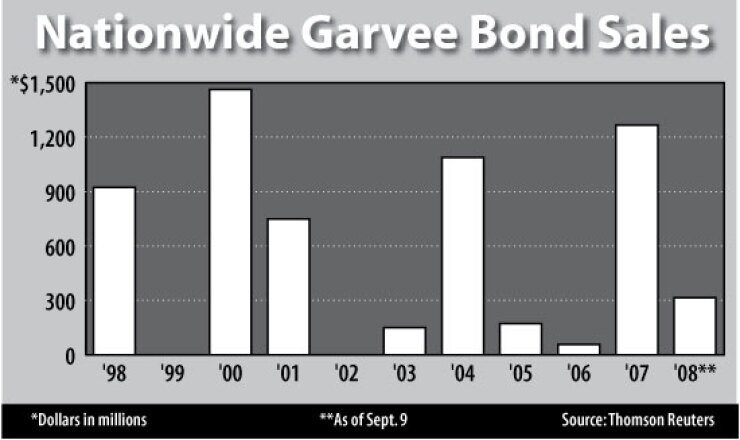
WASHINGTON - The Maryland Transportation Authority yesterday postponed its sale of $425 million of grant anticipation revenue vehicles in what could be the first of several stalled transactions following the federal government's announcement that the federal highway trust fund is nearly depleted.
The U.S. Department of Transportation announced Friday that if $8 billion of general funds are not transferred to the trust fund, it will run out of money by the end of the month, which is the end of fiscal 2008, and it will also run $3.1 billion short next year. The fund had been authorized to pay states $35.3 billion this fiscal year.
The dwindling trust fund and the resulting decision by U.S. DOT officials to ration payments to the states from the fund for highway construction projects could also affect states with outstanding grant revenue anticipation vehicle bonds.
"I think it's going to certainly be a problem ... for anyone who's got bonds outstanding," said Jack Basso, director of management and business development at the American Association of Highway and Transportation Officials. The prospect of long-term strain on federal highway funding to states will affect "probably anybody who's considering issuing Garvee bonds or the equivalent," he said.
"In the case of Maryland, which has a significant number of bonds outstanding, they certainly will make good on them. They're not going to default on them," Basso said.He added, however, that if the state is forced to shoulder the cost of transportation projects that were expected to get federal funding, it would have less money for other projects.
Basso said that Arkansas bond issues could be affected, to a degree, as well "because they're faced with a large amount of [outstanding] Garvees."
Garvees typically are issued by state governments to finance the construction of transportation projects and are repaid with money from the federal highway trust fund. If that money is delayed or withheld, it could impact the states' ability to pay debt service on their bonds.
MdTA's had planned to sell the $425 million of Garvees to finance the ongoing construction of the state's Intercounty Connector, a $2.4 billion, 18.8-mile toll-road project intended to provide an east-west traffic link between I-270 in Montgomery County and I-95 in Prince George's County.
The Garvees had been given a AAA rating from Standard & Poor's in part because they were to be secured by an irrevocable pledge of state tax revenues from Maryland's transportation trust fund in addition to the federal highway trust funds. If the federal funds do not come through, the state would be obligated to provide the money from its trust fund.
Maryland officials and transaction participants could not be reached for comment on the status of the transaction.
The California Department of Transportation has a $143 million Garvee deal on its bond calendar for Oct. 1, but officials have been unwilling to comment on the deal.
States also are delaying or halting highway projects. The Arkansas State Highway and Transportation Department cut a $24 million interstate construction project from its requests for bids on Tuesday because of the recent news about the highway trust fund, said spokesman David Nilles.
Arizona put six federally-funded highway projects, costing a total of $185.5 million, on hold this week. The state is considering delaying more projects including some in the Phoenix metro area.
On Tuesday, Oklahoma deferred 32 contracts totaling just over $73 million that would have paid for construction of highways, interstates and county roads.
Meanwhile, the National Conference of State Legislatures this week joined the chorus of state officials asking Congress to act fast on a pending trust fund rescue bill, which passed with a clear majority in the House of Representatives but was blocked from consideration in the Senate Monday evening by two Republicans.
In the longer term, the NCSL is pushing for a temporary gas tax hike to stabilize the trust fund's balance. The fund relies on gas tax revenues for its income.
The National Governor's Association issued a statement urging Congress to fill the gap.
"The solvency of the highway trust fund is necessary to preserve highway investment and provide the predictable, long-term federal funding on which highway projects and state transportation budgets depend," the statement said. "This funding enables states to continue to finance highway projects that improve safety, ensure rural and urban mobility and access, increase the mobility of people and goods, and promote a sound economy through well-paying construction jobs."





